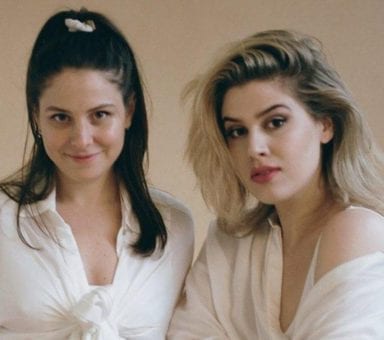Fashion Industry and Eating Disorder Recovery: Can You Be Successful in Both?
Social media takes a lot of heat for portraying a sense of negative body images, triggering images and constant comparisons and unhealthy relationships with food. However, it can be a great way to come together as a community, support each other, and ask questions. Christina Grasso and Ruthie Friedlander are two writers who connected over social media thanks to a shared background; they both worked in the fashion industry and have openly struggled with an eating disorder. Their shared background allowed them to become friends and co-founders when they launched a non-profit peer lead online support network for women in fashion and entertainment battling an eating disorder. The Chain was founded in December 2017 and is a safe place for this population to share their experiences and gain insights through conversation, support and community building. The Chain is just one of many ways to find help for an eating disorder. The Chain has collaborated with brands like Postmates, Chillhouse, Negative Underwear, and more, recently including Cynthia Rowley, all with the goal of destigmatizing eating disorders and ensuring that women struggling with an eating disorder do not feel alone or ashamed.
The fashion industry and body positivity
Co-founders Christina and Ruthie felt both isolated and accomplished after completing eating disorder treatment and found going from regular support meetings to having to deal with recovery alone was a scary and secluded transition. Additionally, Christina found that working in the fashion industry was discouraging for her eating disorder recovery since it is such an image-focused environment. The Chain developed as a way to stay healthy while still being able to work in the fashion industry, an industry that both Christina and Ruthie genuinely have a passion for. The co-founders host a variety of in-person events where members of this online community can come together, support each other and get creative. They hold closed events with designers and brands where individuals can come together and make bracelets, and they also host open events to the public where they work on educating the eating disorder community on things such as responsible media coverage, how to help a friend or colleague, and other practical, action-oriented topics. They also work closely with brands that advocate for body positivity and inclusivity in the fashion industry and will also work with other brands that struggle with how to adopt these values in hopes that they can help these brands understand the importance of how fashion and eating disorders and closely tied together.
Eating disorders come in all shapes and sizes
An individual does not need to look a certain way to have a severe eating disorder that warrants care, concern, and treatment. There is a false misconception that eating disorders always present as an emaciated, young, white female, when in fact eating disorders affect individuals from all walks of life. Eating disorders are often invisible and can be deadly at any phase and as a result, those who are struggling need to be advocates and work hard to receive the proper treatment and care they need and deserve.
From the Founders
“If a brand/person has a desire to learn more about how their messaging affects women with eating disorders, or if a brand/person has a desire to speak about eating disorders, we’re here to help. While Christina and I are huge proponents of body diversity and body positivity, those two things are not always what we’re looking for in terms of commitment. We want to help brands get to that point — both internally and in a consumer-facing way. So sometimes, you may notice we team up with a brand that hasn’t been so great about featuring women of all sizes, or a brand that has yet to extend into size runs in a meaningful way. We’re proud to help these brands get to where they need to be and feel it’s our responsibility to work with brands that both get it and that want to get it”, according to both co-founders.

